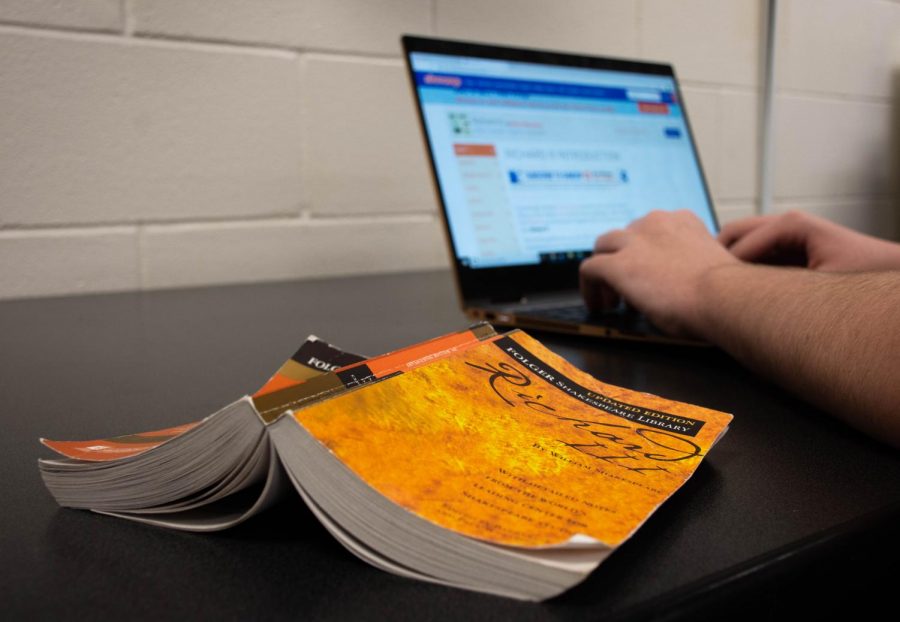Looking for shortcuts when doing difficult work is human nature. Whether we look for tips on making tasks easier or we attempt to bypass effort altogether, there’s always something that some people like to turn to for help. For English students, support can be found with online study guides, most notably websites like Shmoop, LitCharts, SparkNotes and CliffNotes. Students can log onto these websites and access summaries in the simplest forms for texts or concepts and study annotations containing themes and analysis of challenging subtext.
Trinity students face this issue regularly. In a survey conducted with middle schoolers and high schoolers, 87 percent of students say that online study guides are acceptable, with 65.3 percent using them for the purpose of reading summaries alongside a text. An alarming 32.3 percent stated that when they have too much work to handle, they rely on online study guides instead of reading the text.
Junior Caitlin Hawley finds the use of online study guides, particularly LitCharts, helpful for understanding difficult works of literature.
“I’ll be reading and I’ll look at the summary or read the analysis alongside chapters I wouldn’t understand,” Hawley said.
She said that she likes to read analysis boxes on the side of the webpage if she is reading something that even summaries can’t completely explain. While this appeal is
important to her study, she wishes that Shmoop and LitCharts were more helpful in identifying quotations.
“If I’m using LitCharts to help me study I might struggle with identifying the speaker of a passage,” Hawley said. “I’ll know the analysis of it, but it is harder, especially if I am not as familiar with one story as I am with another.”
Despite this flaw, Hawley still believes that online study guides enhance her reading experience and better prepare her for tests.
English Department Chair Mr. Steven Krueger, however, is strongly opposed to the use of online resources, naming Shmoop as a crutch instead of a helpful tool.
“It shortchanges students because the quality of the writing is weaker,” Krueger said. “Students don’t become better thinkers by reading that level of diction that Shmoop uses—hip and conversational. It’s a problem because it gives off the impression that there is only one way to interpret the text, which is not true.”
Krueger knows that students often rely too heavily on Shmoop for English classes, and says these websites have the potential to affect the text choices and curriculum of specific classes. He believes it might encourage teachers to choose stories and novels that are harder to find summaries for online, resulting in a classroom shift towards more in-class study.
“With authors like Shakespeare, I do a lot of reading with the students, and I’ve actually found that to be a net gain,” Krueger said. “I can hyper-focus on themes and walk students through problems as we encounter them together.”
By setting this precedent for the way English is taught, Krueger hopes to make class and reading much more enjoyable for students and discover new ways of thinking and enjoying literature.
“Teaching in this way has become a positive because I’m modeling certain types of reading strategies that students might enjoy more instead of using online study guides,” Krueger said. “Because let’s face it: Shmoop doesn’t give you the same experience.”
Not all English teachers are as resistant to online study guides. Honors English 10 teacher Melanie Farmer said that while the dependency of online study guides is not an efficient way of understanding complicated material, they can be useful if the study aid is utilized in a reasonable way.
“There are some kids where Shmoop genuinely does help them,” Farmer said. “It’s the same thing with an audiobook, which isn’t a bad idea if they’re using it to keep on track. Shmoop becomes a problem when it completely supplants reading because they’re not getting the experience of what we’re trying to train students for.”
Although it is a problem that is acknowledged, she said that inherently searching for slip-ups in students’ work giving away what they have read is not her solution for preventing students from ignoring assigned reading assignments.
“People think that teachers are looking for their students to say ‘x’, ‘y’, or ‘z’, and that’s a destructive attitude,” Farmer said. “When I grade 20 papers and see the same thing over and over, I notice patterns or differences in the way my students write. The school is small enough that if a kid comes up with something super complicated, I’ll know if they used an outside source.”
Through encouraging casual, open-ended discussions in class and guiding students into thinking independently about a text, Farmer is working to avoid the reliance of online study guides but not rule them out as support.
“It’s possible that I’ll get a class of 20 kids who aren’t engaging in circle discussion because they’ve used Shmoop, and as a teacher, you can feel it; it’s like a thud,” Farmer said. “I require page numbers and evidence from the text during the discussions to move students away from relying on Shmoop because I want my students to be prepared and be able to think critically.”
Farmer understands the pressure of other academics as well as extracurriculars and does not deny that online study guides can be helpful to an extent in time constraints.
“As long as a student is upfront and makes an effort to catch up on the reading, I don’t have a problem with a student using online study guides in that case,” Farmer said.
Understanding the conveniences and consequences of online study guides, some students continue to be hopeful in their academic success. Students like freshman Dalton Joseph recognize the potential difficulty of future texts and are open to the possibility of visiting these websites and learning to navigate them effectively should the work become harder to comprehend.
“The reading isn’t much, and it’s not that hard,” Joseph said. “If things get worse I might consider using Shmoop for the summaries to help speed things along. But I’m not concerned right now.”
The debate over the long-term use of online study guides being helpful is still being discussed by teachers and students. With a curriculum emphasizing guided classwork and independent home study and a positive attitude about reading and classwork, the abuse of these websites might be less frequent. Maintaining the precedents and considering the opinions of teachers encouraging against long-term use would make English class easier to navigate.





